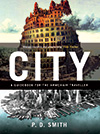With Riddley Walker in Paris
17 November 2006 | atomic bomb, cold war, Hoban, Paris, photography, Science & literature, Writing & Poetry | Post a comment
Just back from a much-needed break in Paris. It's a great place in which to just wander aimlessly around, absorbing the sights and sounds. And that's precisely what my partner and I have been doing for the last couple of days. The washed-out colours of autumn go well with the faded imperial grandeur of its avenues and monuments.
 Of course, when it comes to food and wine, France still rules the world. Even simple and inexpensive things like cheese and bread taste better here. How is it that we have completely forgotten how to make mouth-watering bread here in Britain? Answers on a (French) postcard please.
Of course, when it comes to food and wine, France still rules the world. Even simple and inexpensive things like cheese and bread taste better here. How is it that we have completely forgotten how to make mouth-watering bread here in Britain? Answers on a (French) postcard please.
My tip for a café: Le Boulanger des Invalides Jocteur on the corner of the Ave de Villars and Bd des Invalides. After indulging in their coffee and cakes you could do worse than take a stroll in the Parc André Citroën, a new discovery for me. It's a formal, French garden updated for the modern age: large in scale but full of beautiful, intimate spaces. A great place to take photos – I've put some on my Flickr site. (Thanks to Kindra for explaining how to post images in the blog...let's see if it works!)

I've been meaning to read Riddley Walker by Russell Hoban for a long time and the Eurostar train journeys to and from Paris provided the ideal opportunity. I'm glad I did – it is a quite extraordinary novel: the kind of writing that haunts your memory for days and weeks afterwards. The novel – which was published in 1980 – is set many years after civilisation has destroyed itself in its quest for the "1 Big 1". The world has been blasted back to the stone age, to use the unforgettable phrase of one Cold War general. Life for the inhabitants of the post-apocalyptic planet is now nasty and short. Their technology is virtually non-existent and they have an understandable fear of "cleverness" – anything that we might call science. The hubris of "Eusa" and his deadly fascination with "the Addom" that led to doomsday has become a mythic story that fills the people of the future with dread. Riddley Walker, the main character, is thrown into an intrigue involving "yellerboy", "chard coal" and "Saul and Peter". Sulphur, charcoal and saltpetre to you and me – the ingredients of what this future world calls the "1 Littl 1". Their society is about to take its first steps on the road that leads first to gunpowder and explosives, then eventually to atom bombs. It seems humankind is simply too clever for its own good.
Hoban's creation of a new language or dialect in the novel is a great achievement. At first, the difficulty of reading is a barrier between you and the text. But gradually the language draws you into a new world, one that is also disturbingly familiar. Let me give you a sample of his writing. Here's a character telling Walker how the knowledge of making gunpowder cannot now be suppressed:
"You can get jus as dead from a kick in the head as you can from the 1 Littl 1 but it's the nature of it gets people as cited. I mean your foot is all ways on the end of your leg innit. So if youre going to kick some 1 to death it aint all that thrilling is it. This other tho you've got to have the Nos. of the mixter then you've got to fynd your gready mints then you've got to do the mixing of the mixter and you've got to say the fissional seakerts of the act befor you kil some body its all that chemistery and fizzics of it you see. Its some thing new."
There's a remarkable poetry and range in this artificial language. The struggles of the boy-man Walker to understand the past of the world he has been born into echo our own attempts to cope with innovation and change in a world poised on the brink of self-destruction. As Walker puts it, almost in despair:
"If you cud even jus see 1 thing clear the woal of whats in it you cud see every thing clear. But you never wil get to see the woal of any thing youre all ways in the middl of it living it or moving thru it. Never mynd."
So that's my recommendation to you for the autumn: take a trip to Paris and buy a copy of Hoban's brilliant book. It worked for me.
[originally on MySpace]

